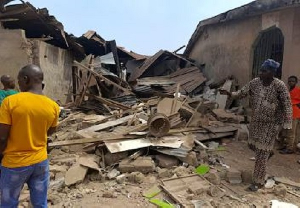How good it would be to join a bus from your hometown in Bunkpurugu-Yunyoo to Accra, knowing well you have already liaised with the Rent Control Department online to assess and express interest in some available places; that you will be completing the transaction when you have arrived and accepted the place; and that your tenancy agreement will be facilitated and secured by the department online and you will not be chased out or harassed by any inconsiderate landlord.
And how good it will feel to send just a text message and, in some hours, the Electricity Company of Ghana are in your home or community to get the fault fixed. Yes, that’s how technology can enhance our lives. Isn’t it?
It is the reason why the Government’s intention to digitize the operations of the Rent Control Department comes as welcome news to some of us. According to media reports, the Vice President, Dr Mahamudu Bawumia said on Wednesday, July 15, 2020, that “with digitization, landlords and tenants will have an option to register as well as submit their tenancy agreements electronically. This will reduce the queues at the office and enhance efficiency. Each property will be uniquely identified by the digital property address. From next year all complaints by tenants or landlords can be filed online.”
In fact, the vigour with which Dr Mahamudu Bawumia is pursuing Ghana’s digitization agenda is commendable and certainly the way to go as a middle-income country. We should get to a time that, through our digital addresses, phone numbers, etc. all institutions can easily locate their clients. When you have a problem with water or electricity, for instance, you could simply send a message and they will get in touch to provide the required assistance. We do not have to go and spend the whole day at the offices of the Electricity Company of Ghana (ECG) or the Northern Electricity Distribution Company (NEDCO).
We must also get to a point, where you can renew your driver’s license by just a text message or app. You could make the necessary payments online and make an appointment to visit the centre to do any physical checks that are required. The time and resources we spend to visit places like ECG, passport office, National Health Insurance Scheme (NHIS), Driver and Vehicle Licensing Authority (DVLA), etc. could be spent more productively. We would be able to save this nation a lot of resources if we integrate these digital systems in a way that institutions such as the NHIS, DVLA, National Identification Authority (NIA) and the Electoral Commission (EC) do not have to be doing biometric registration separately. And of course, through digitization, we would be better able to minimize corruption and level the ground for both the rich and the poor.
One area that the Veep should consider, critically, is the digitization of the processes to access information from Government institutions. Certainly, this is very essential for ensuring transparency and accountability and, also, getting citizens to participate effectively in the governance process. Indeed, for Ghanaians to be citizens and not spectators, they need to be properly informed. It would be counter-productive if it becomes cumbersome to secure information, despite the Right to Information law. Through digitization, I should be able to sit in my village in Kumbungu and send a simple text message or go on an app to make a request for information related to the procurement and contracting for the classroom or road project in my area. I could make any payments, if required, electronically and the information could be made available to me electronically or physically based on my preference.
Meanwhile, it is important for us to ensure value-for-money and that Ghanaians are not short-changed, as some people have pointed out recently. It is also essential that, at each point, we carry everyone along by making the technology accessible to all sections of our population, particularly the low-income, low-tech, informal sector population. The carpenter could renew his NHIS, pay his water bill and report a fault to his meter whilst still polishing his newly built wardrobe. As N. Narayana (2003) noted, “building the technological capabilities of countries to make and apply technology choices is important. But equally crucial is building the capabilities of the poor to manage technological change. Poor people must be enabled to make technology choices. They must forge their livelihoods in the private, informal sector, working in their fields, homes and small workshops, and making vital decisions about the best use of their limited assets in order to survive on the tightest margins.”
Again, we must make sure that such systems do work as required and that we reduce to the barest the possibility of people bypassing or sabotaging the system. Presently, I can say with certainty that some persons at the passport office discourage people from using the online application process. They will tell you “if you want to get your passport, massa come and we will do it for you. If you follow this online thing, you will suffer.” This is unacceptable. If it turns out that those who use online actually go through difficulties and delays, then we would only be emboldening those unscrupulous elements at institutions such as the passport office and DVLA.
Finally, it cannot just be the Veep’s agenda. This is our country’s agenda and we must support and see it grow beyond the Veep or the current Government. We should not allow this also to suffer our “one step forward, two steps backwards” syndrome, as other sectors have.
Mohammed Nurudeen Salifu, Communication and Development Practitioner, salifunuru@gmail.com
Opinions of Monday, 20 July 2020
Columnist: Mohammed Nurudeen Salifu
Bawumia’s digitization agenda – The future we must build together
Entertainment












